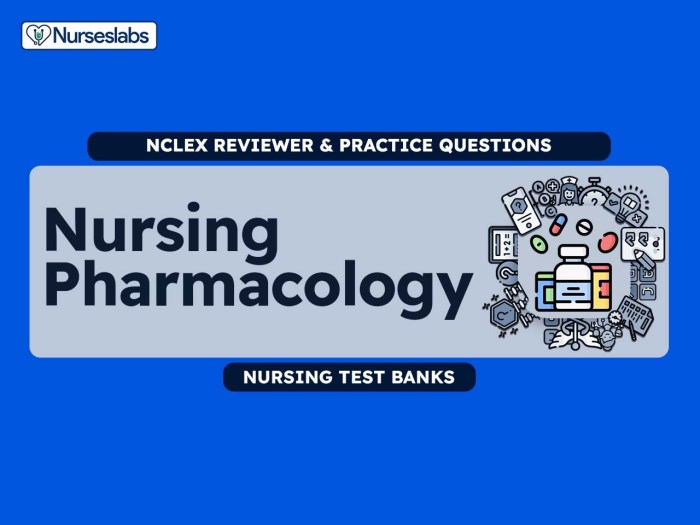The test bank for advanced pharmacology is an indispensable resource for students seeking to excel in their studies. It provides a comprehensive collection of high-quality test questions that cover the essential concepts and principles of advanced pharmacology. This resource empowers students to assess their understanding, identify areas for improvement, and ultimately achieve their academic goals.
This meticulously crafted test bank has been designed to align seamlessly with advanced pharmacology curricula. The questions are carefully structured to test students’ knowledge and critical thinking skills. By engaging with these questions, students can deepen their understanding of complex pharmacological mechanisms, drug interactions, and therapeutic applications.
1. Overview of Advanced Pharmacology: Test Bank For Advanced Pharmacology

Advanced pharmacology is a specialized branch of pharmacology that deals with the study of drugs and their interactions in complex and specialized medical conditions. It involves understanding the mechanisms of drug action, pharmacokinetics, pharmacodynamics, and therapeutic applications in various patient populations.
Advanced pharmacology plays a crucial role in healthcare by optimizing drug therapy, improving patient outcomes, and minimizing adverse drug reactions. It is essential for healthcare professionals to stay abreast of advancements in pharmacology to provide safe and effective drug therapy.
The field of advanced pharmacology is constantly evolving, with ongoing research and discoveries leading to new drugs and therapeutic approaches. This presents challenges for healthcare professionals to stay updated with the latest advancements and ensure that their knowledge and skills are current.
2. Components of a Test Bank for Advanced Pharmacology
A comprehensive test bank for advanced pharmacology should cover essential sections and topics to adequately prepare students for exams and clinical practice.
- Drug Classes:Questions on different drug classes, their mechanisms of action, indications, and adverse effects.
- Pharmacokinetics and Pharmacodynamics:Questions on drug absorption, distribution, metabolism, excretion, and their impact on drug efficacy and toxicity.
- Special Populations:Questions on drug therapy in specific populations, such as geriatrics, pediatrics, and patients with renal or hepatic impairment.
- Case Studies:Questions that present real-world clinical scenarios and require students to apply their knowledge to solve problems and make therapeutic decisions.
Test banks can include various types of questions, including multiple choice, short answer, true/false, and case studies. Each type of question serves a specific purpose in assessing student understanding.
Using a test bank for exam preparation offers several benefits. It provides students with:
- Practice and Reinforcement:Students can practice answering questions and reinforce their knowledge of advanced pharmacology concepts.
- Self-Assessment:Test banks allow students to assess their understanding and identify areas where they need additional study.
- Exam Preparation:Questions in test banks are often similar to those encountered on exams, helping students prepare effectively.
3. Evaluation Criteria for Test Bank Quality
To ensure the quality and reliability of a test bank, it is essential to establish evaluation criteria.
- Accuracy:The questions should be factually correct and up-to-date with the latest advancements in advanced pharmacology.
- Comprehensiveness:The test bank should cover a wide range of topics and drug classes relevant to advanced pharmacology.
- Alignment with Course Objectives:The questions should align with the learning objectives of the advanced pharmacology course.
When selecting a test bank, healthcare professionals should consider factors such as:
- Reputation of the Publisher:Choose test banks from reputable publishers known for producing high-quality educational materials.
- Reviews and Feedback:Read reviews and seek feedback from other healthcare professionals who have used the test bank.
- Preview Option:If possible, request a preview of the test bank to assess its content and quality before purchasing.
4. Design and Structure of a Test Bank
| Section | Topics | Question Types |
|---|---|---|
| Drug Classes | Antimicrobials, Cardiovascular Drugs, CNS Drugs | Multiple Choice, Short Answer, Case Studies |
| Pharmacokinetics and Pharmacodynamics | Drug Absorption, Metabolism, Elimination | True/False, Short Answer, Case Studies |
| Special Populations | Geriatrics, Pediatrics, Hepatic Impairment | Multiple Choice, Case Studies |
| Case Studies | Real-World Clinical Scenarios | Case Studies |
Test bank questions should be clear, concise, and challenging. They should assess students’ understanding of concepts, critical thinking skills, and ability to apply knowledge to clinical situations.
Well-structured test bank questions:
- Use Clear Language:Avoid ambiguous or technical language that may confuse students.
- Provide Context:Include sufficient context to set the stage for the question and make it relevant to advanced pharmacology.
- Test Higher-Order Thinking Skills:Go beyond basic recall and ask questions that require students to analyze, synthesize, and evaluate information.
5. Utilization of a Test Bank in Advanced Pharmacology Education, Test bank for advanced pharmacology
Test banks can be effectively integrated into advanced pharmacology courses to enhance student learning and exam preparation.
Formative Assessment:Test banks can be used as formative assessments to provide students with feedback on their understanding throughout the course.
Summative Assessment:Test banks can also be used as summative assessments to evaluate student learning at the end of a unit or course.
Strategies for using test banks to enhance student engagement and learning outcomes:
- Regular Practice:Encourage students to use the test bank regularly to reinforce their knowledge and identify areas for improvement.
- Discussion and Review:Use test bank questions as a basis for class discussions and review sessions to clarify concepts and address common misconceptions.
- Personalized Learning:Provide students with individualized feedback based on their performance on test bank questions to guide their study efforts.
Answers to Common Questions
What is the purpose of a test bank for advanced pharmacology?
A test bank for advanced pharmacology provides a comprehensive collection of high-quality test questions designed to assess students’ knowledge and understanding of advanced pharmacology concepts and principles.
How can a test bank benefit students?
By engaging with the questions in a test bank, students can identify areas for improvement, reinforce their understanding of complex pharmacological mechanisms, and enhance their overall learning outcomes.
What factors should be considered when evaluating a test bank?
When evaluating a test bank, factors such as accuracy, comprehensiveness, alignment with course objectives, and effectiveness in improving student learning should be taken into account.